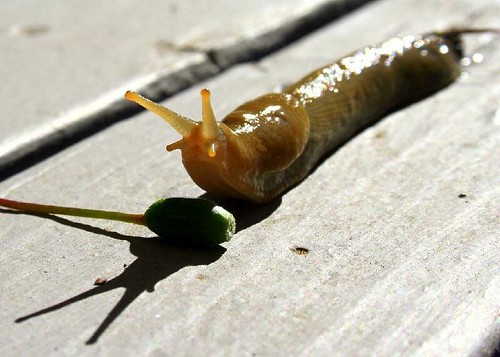“Trying to be weird and strange isn’t as interesting as coming up with a reason for it,” Arthur Bradford says of his 2001 short story collection, Dogwalker, in an interview with Robert Birnbaum. Labeling Bradford’s work “weird” may be a bit of an understatement, given stories that include a woman giving birth to a glowing frog, a family of cat-faced carnival workers, a human/canine love affair, and all manner of mutant dogs: talking, three-legged, Siamese triplets, born with furry flippers instead of legs, etc. But Bradford makes the strange seem not only usual, but welcome and beautiful. Bradford’s weirdness is rooted in compassion—unrelenting desires to see the underdog triumph and to blur the lines between human and nonhuman, between normal and abnormal.
Of all of Bradford’s stories, “Mollusks,” in particular, struck me when I was a young writer for its ability to evoke the luminous from the grotesque. An unnamed protagonist and his friend, Kenneth, scavenge through a field of burned-out automobiles and find a ten-pound yellow slug in a glove box. Kenneth immediately sees an entrepreneurial possibility: he takes the slug home in a plastic grocery bag and starts calling up potential collectors. Kenneth’s wife, Terresa, is repulsed by the slug. The protagonist interprets her disgust as an indication of marital problems and decides to make his move:
Thou shalt not covet thy neighbor’s wife, right? Well, fuck that, I thought, look at Kenneth. He collects slugs, giant ones. Where does he get off marrying a woman like Terresa?
Eventually, Kenneth realizes that his only interested buyers are a group of Satanists, who want to sacrifice the slug in a bizarre ritual. When he returns to find his wife embracing his friend, he resolves not to let the slug come between them and heaves it out into the lawn. The narrator reflects on the slug as a symbol of man’s interference in the natural order of things:
Who are we to decide the fate of the earth’s creatures? […] It was the mollusks, after all, who first inhabited this earth.
As a young reader, I loved this epiphanic ending, but for me, the slug was a greater symbol, too: it was a symbol of the esoteric potential of the short story itself, of the fiction writer’s ability to transcend dreary realism and be beholden instead to some broader conception of human truth, however gnostic, mundane, or deformed that truth may be.
- Read “Mollusks” in Arthur Bradford’s collection Dogwalker
- Read interviews with Bradford at Identity Theory, Hobart, and The Believer






